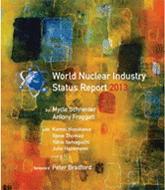

FUKUSHIMA NEWS
~ ~ ~ ~ ~ ~ ~
Help the
NO NUKES Y'ALL
campaign
y'all
Nuclear Watch South is a 501(c)(3) tax-deductible charitable organization.
{ thanks }
PayPal
It's your
safe and secure
way to donate on-line
 |
~ ~ ~ ~ ~ ~ ~

~ ~ ~ ~ ~ ~ ~
NEW NUKES for Georgia???

NO THANKS!!!
CLICK HERE
~ ~ ~ ~ ~ ~ ~
THE ECONOMICS OF NUCLEAR REACTORS:
RENAISSANCE OR RELAPSE?
by Dr. Mark Cooper
Read the synopsis
MASSIVE SUBSIDIES WON'T SOLVE CLIMATE CHANGE
by Peter Bradford
"Florida Power and Light Billion-Dollar
Rate Hike Denied"
Salem News
"Leaks Imperil
Nuclear Industry"
The Boston Globe

Educating and activating the grassroots to create a
nuclear-free future
~
PO Box 8574
Atlanta, GA 31106
404-378-4263
Cell 404-432-8727
info@nonukesyall.org
NO NUKES Y'ALL!
GEORGIA | STOP CWIP NUCLEAR TAX
Georgia General Assembly Votes to Sunset CWIP
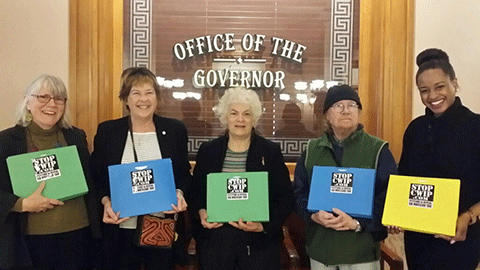
STOP CWIP COALITION DELIVERS PETITION TO STOP CWIP TO GOVERNOR NATHAN DEAL
(L-R) Betsy Rivard, Glenn Carroll, Stephanie Coffin, Tom Ferguson, Lindsay Harper celebrate the bill to amend the Georgia Nuclear Energy Financing Act of 2009 by delivering copies of the petition to governor and key legislators at the end of the 2018 legislative session. Photo © 2018 Gloria Tatum.
ATLANTA 3/27/18 — Representatives of the Stop CWIP Coalition delivered a petition containing more than 3,000 signatures to Governor Nathan Deal’s office in support of the recent passage of Senate Bill 355 to sunset the Georgia Nuclear Energy Financing Act of 2009 with the Vogtle 3 & 4 project. The bill is awaiting the governor's signatures to become law.
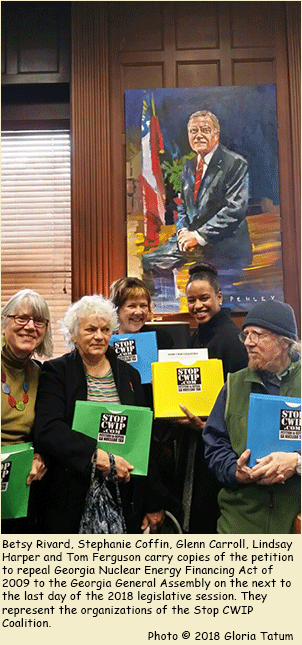 In 2013 several groups launched the Stop CWIP Campaign with a petition drive to repeal the 2009 law. The groups forming the Stop CWIP Coalition are: ARRP (Aging Raging Rate Payers), Atlanta Grandmothers for Peace, Center for a Sustainable Coast, Georgia WAND (Women’s Action for New Directions) and Nuclear Watch South.
In 2013 several groups launched the Stop CWIP Campaign with a petition drive to repeal the 2009 law. The groups forming the Stop CWIP Coalition are: ARRP (Aging Raging Rate Payers), Atlanta Grandmothers for Peace, Center for a Sustainable Coast, Georgia WAND (Women’s Action for New Directions) and Nuclear Watch South.
The groups delivered the petition entitled “Stop the Nuclear CWIP Tax" in support of Governor Deal’s anticipated signature to ratify Senate Bill 355 which sunsets the Georgia Nuclear Energy Financing Act of 2009. The controversial law legalized collection of advance payments for Vogtle 3 & 4 which are under construction in Burke County. The nuclear tariff has been charged on residential and small business electric bills since 2011. The additional Vogtle reactors are currently less than half-built and are at least $5 billion over budget and five years behind schedule. Senate Bill 355 easily passed both the Senate and the House and now awaits Governor Deal’s signature.
Nuclear Watch South's Glenn Carroll says, "The Stop CWIP Coalition is very pleased that the Georgia General Assembly easily passed the amendment to stop the bad law enabling Georgia Power to capitalize on boondoggles like Plant Vogtle in the future. We celebrate being able to present Governor Deal with the Petition to Stop the Nuclear 'CWIP' Tax signed by more than 3,000 Georgia rate payers, tax payers and voters, as tangible evidence of popular support for signing SB355 into law."
"Senate Bill 355 is a timely and sensible move by Georgia leadership in the face of the crumbling prospects for successfully completing Vogtle 3 & 4," she said.
Full text of petition:
THIS IS A PUBLIC PETITION TO THE GEORGIA GENERAL ASSEMBLY FOR REDRESS OF GRIEVANCE
In 2009 the Georgia General Assembly enacted “Georgia Nuclear Energy Financing Act” establishing a framework for Georgia Power Company, Oglethorpe Power Corporation, Municipal Electric Association of Georgia and the City of Dalton to charge Georgia residential electric customers Construction Work in Progress (CWIP), a hidden tax to construct two nuclear reactors, Plant Vogtle Units 3 & 4.
WHEREAS
• Residential and small business electric customers have been charged CWIP (also called Nuclear Construction Cost Recovery) for Plant Vogtle on electricity bills since 2009;
• CWIP rates have escalated at three times the rate originally approved by the Georgia General Assembly and Georgia Public Service Commission;
• CWIP is a 9% tax on our electric service which removes the liability of speculation on financially risky reactor investment from the electric companies and places the risk on residential and small business electric customers;
• CWIP forces Georgia electricity customers to invest in a Southern Company construction project without receiving stock certificates, returns or any other shareholder benefits;
• It is unjust and unreasonable and a bad precedent to charge for financing facilities and infrastructure before operational and used for service;
• Plant Vogtle is only 40% complete but is already $5 billion over budget and five years behind schedule.
THEREFORE we, the undersigned, PETITION the Georgia General Assembly to REPEAL THE CWIP TAX.
What is CWIP?
CWIP Stands for "Construction Work In Progress"
CWIP stands for Construction Work in Progress and is a statewide corporate nuclear tax that all Georgia residential and small business electricity customers are currently paying on their utility bills.
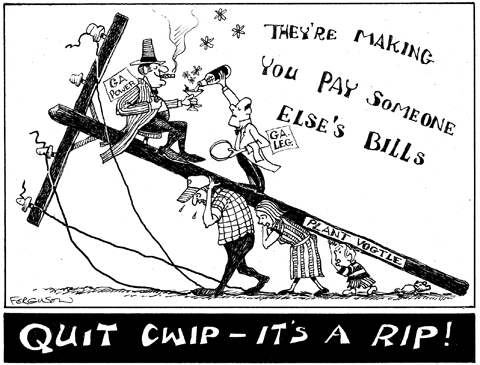 ©2013 Tom Ferguson
©2013 Tom Ferguson
CWIP is Corporate Welfare
Georgia lawmakers passed the controversial CWIP measure, also known as "Georgia Nuclear Energy Financing Act" in 2009 which made it legal for Georgia Power and Georgia electric companies to force customers to pay upfront for nuclear reactor construction. This is a form of corporate socialism in that the public pays for the Vogtle nuclear project and the corporation reaps the profits. When, and if, the reactors are completed, the companies will charge customers again to use the product for which they already paid.
CWIP is Nuclear Construction Cost Recovery
CWIP is listed on your Georgia Power bill as "Nuclear Construction Cost Recovery" and the amount is a 7% hidden tax on your electricity use every month. If your electricity provider is a local utility and they are in Georgia they are charging you CWIP whether they list it on your bill or not. It is a few dollars every month per customer but puts billions into Georgia Power’s pocket because this sweetheart deal also guarantees Georgia Power an 10.95% profit.
Senator Mike Fasano, a pro-business Florida Republican says,
"We’ve learned the hard way in Florida that allowing utilities to recover the costs of a new power plant before the plant is even placed in service is unfair to consumers and bad public policy."
The Florida reactor project is indefinitely postponed yet Florida ratepayers are still being charged CWIP.
CWIP is a Nuclear Tax
The CWIP nuclear tax is a financial mechanism by which Georgia Power avoids the risk of building the Vogtle reactors by charging ratepayers higher rates to cover future costs of constructing two new nuclear reactors at Plant Vogtle, even if those reactors are never completed.
CWIP is a Forced Investment in Southern Company
The statewide corporate nuclear tax (CWIP) forces consumers to become investors in risky future nuclear reactors without receiving any stocks, bonds or dividends from the corporation. The citizens of Georgia are paying for the construction of the reactors in addition to paying for the electricity they use while Georgia Power rakes in the profits.
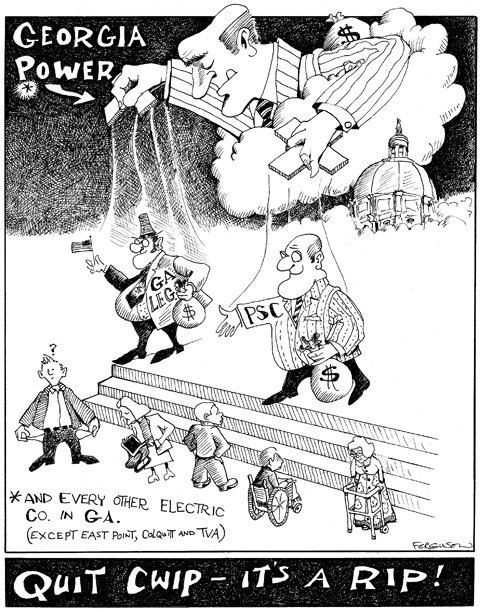 ©2013 Tom Ferguson
©2013 Tom Ferguson
CWIP is a Rip-Off
CWIP is a rip-off game from beginning to end, because the Public Service Commissioners rubberstamp the financial schemes of monopolistic Georgia Power instead of protecting the interests of Georgia ratepayers. So far the PSC has approved several rate hikes with many more in our future. Under the corporate CWIP nuclear tax, utility customers will continue to pay periodic rate increases to pay interest to bondholders and returns to shareholders on capital invested in nuclear power plants. When citizens complain about this unfair tax to the PSC, they say ìit’s not our fault, take it to the legislature — they are the ones that passed the law.
CWIP is a Blank Check to Georgia Power
CWIP gives Georgia Power a virtual "blank check" that encourages an attitude of relaxed responsibility toward controlling construction costs. As evidenced by their being $1.6 billion over budget the first few months of construction, this lack of responsibility in controlling construction costs increases the cost of the reactors and the cost of nuclear power to residential and small business customers who are already suffering financially from the prolonged recession.
CWIP Hurts Older People the Most
Seniors may pay the nuclear tax for years and never use the the power from Vogtle, because the reactors may go on line after their death, if ever. Southern Company and its Vogtle partners serve a wide market and the nuclear electricity may be sold to other states and not Georgia.
Repeal the CWIP Tax
Nuclear Watch South is running an education campaign to Repeal the Georgia Nuclear Energy Financing Act and Stop the Nuclear CWIP Tax. We will be traveling around the state of Georgia to meet with local groups and citizens to familiarize folks with CWIP. At the center of our campaign is a simple petition to show legislators that the people do not want to pay a forced tax to build new reactors. Please sign the petition. If you wish to do more you may download the petition and gather signatures from your neighbors and friends. Contact Nuclear Watch South to invite us to come and talk to your group or friends.
SIGN THE STOP CWIP PETITION >>
DOWNLOAD THE STOP CWIP PETITION >>
STOP CWIP FACT SHEET >>
DOWNLOAD, PRINT & FOLD STOP CWIP FACT SHEET >>
"To the village square
we must carry the facts
of atomic energy.
From there must come America's voice."
ALBERT EINSTEIN
~~~~~~

~~~~~~
HOT REPORTS
WORLD NUCLEAR INDUSTRY STATUS REPORT 2013
by Mycle Schneider and Antony Froggatt
July 2013
RENAISSANCE IN REVERSE
by Dr. Mark Cooper
July 2013
~~~~~~
ACTIVISTS SEE U.S. NUCLEAR INDUSTRY BEGINNING TO CRUMBLE
by Matthew C. Cardinale
IPS News Agency
~~~~~~
BACKGROUND ON OPPOSITION TO NUCLEAR BAILOUTS
USA Today:
In a LETTER to Obama, four groups — the National Taxpayers Union, Taxpayers for Common Sense, the George Marshall Institute and the Non-Proliferation Policy Education Center — oppose an expansion of loan guarantees for new nuclear plants: "With hundreds of billions in bailouts already on the shoulders of U.S. taxpayers, the country cannot afford to move forward with a program that could easily become the black hole for hundreds of billions more."
Conservative Heritage Foundation's, David Kreutzer, a senior policy analyst in energy economic and climate change, warned against expanding loan guarantees: "This authorized $18.5 billion in loan guarantees will help build a handful of new nuclear reactors but any expansion of subsidies, tax credits or loan guarantees is a bad idea for taxpayers, consumers and long-term industry competitiveness. Continuing subsidies reduce the incentive to contain costs, create government dependence and stifle competition and technological development within the nuclear energy industry."
Economist Dr. Mark Cooper at the Institute for Energy and the Environment at Vermont Law School, authored a report in June that found it would cost $1.9 trillion to $4.1 trillion more over the life of 100 new nuclear reactors than it would to generate the same electricity from a combination of more energy efficiency and renewables.
Peter Bradford, former NRC Commissioner: "Of 26 new nuclear reactor license applications submitted to the Nuclear Regulatory Commission since 2007, nine have been canceled or suspended indefinitely in the last 10 months. Ten more have been delayed by one to five years. The Tennessee Valley Authority has canceled plans to revive a partially built unit.’”

